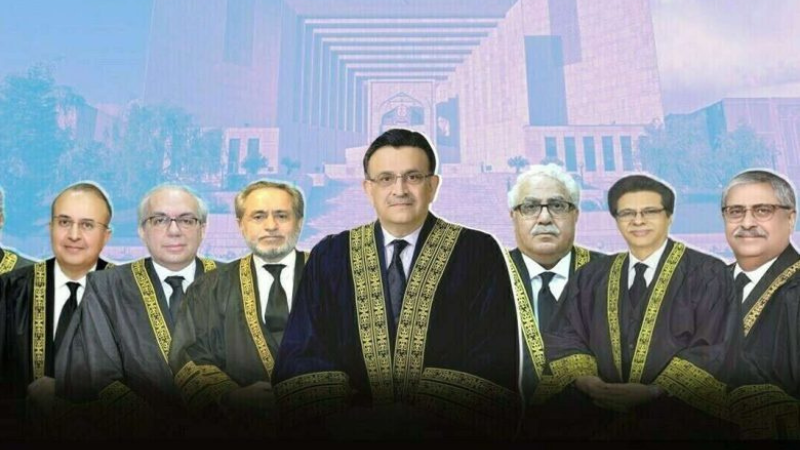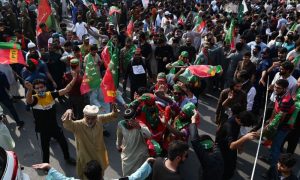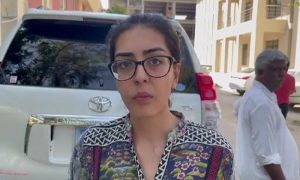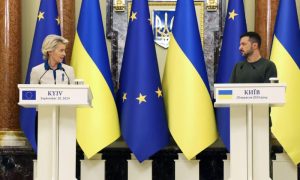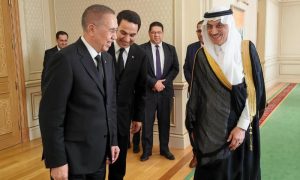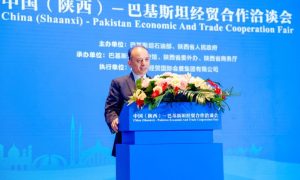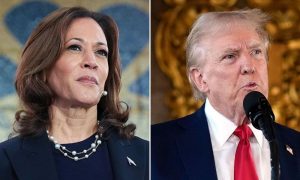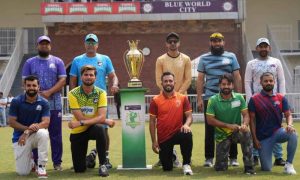Staff Report
ISLAMABAD: Five judges bench of the Supreme Court — instead of the earlier formed nine-member bench — on Monday resumed hearing the suo motu case proceedings about the delay in the announcement of a date for elections in Khyber Pakhtunkhwa and Punjab.
The nine-member bench of the apex court formed to hear the suo motu case related to the elections in Punjab and Khyber Pakhtunkhwa was dissolved. The bench was reconstituted after Justice Yahya Afridi, Justice Sayyed Mazahar Ali Akbar Naqvi, Justice Ijaz Ul Ahsan, and Justice Athar Minallah recused themselves from hearing the case.
Following this, a five-member bench of Supreme Court headed by Chief Justice Umar Ata Bandial and comprising Justice Mandokhail, Justice Munib Akhtar, Justice Muhammad Ali Mazhar, and Justice Shah resumed the hearing.
President Dr Arif Alvi also expressed no-confidence on the Attorney General Shehzad Ata Elahi and nominated Barrister Salman Akram Raja as his counsel in the case.
When the hearing resumed, CJP Bandial said that four judges had recused themselves from the larger bench.
“We will continue the hearing to interpret the Constitution because what the Constitution depends on its interpretation,” CJP stated.
CJP says Supreme Court will try to wrap up the case tomorrow
The chief justice went on to say that the court will resume hearing the suo motu case at 9:30am tomorrow, adding that the court will try to wrap up the proceedings tomorrow.
Chief Justice Bandial also pointed out that the note of one judge, Justice Mandokhail had been released on social media even before the verdict was released. “We will take precautionary measures so that such an incident does not occur in the future.”
“The rest of the court’s bench will keep on hearing the case,” said the CJP. He added that the court will continue hearing the case for the Constitution’s interpretation.
The CJP also noted that till the written order is not released on the website they cannot issue it.
“We will be cautious that this does not happen in the future,” said the CJP.
The court then directed Barrister Ali Zafar, the counsel for the speakers of the Khyber Pakhtunkhwa and Punjab assemblies, to argue whether the apex court should hear the case.
“Can the apex court hear this case or not? In any situation, the case has to be completed tomorrow,” said the CJP.
Pakistan Peoples Party (PPP) lawyer interjected that the ruling parties had filed a plea for the formation of a full court bench.
The chief justice then remarked that they will hear all the pleas and decide them.
Following this, Ali Zafar, the lawyer representing the speakers’, started his arguments and said that the chief minister of Punjab had sent the summary for the dissolution of the provincial assembly to the governor.
“The governor was legally bound to dissolve the assembly, however, he did not and the provincial assembly was automatically dissolved after 48 hours,” said Zafar.
The lawyer said that no officeholder can delay elections for more than 90 days, adding that the 90-day period in Punjab begun on January 14.
“Who appoints the governor?” questioned Justice Mazhar.
At this, Zafar said that the governor is appointed after the president’s approval.
Upon hearing this, Justice Mazhar remarked that there is a difference between an assembly being dissolved by the Punjab governor and its dissolution by itself following the completion of the constitutional term.
While Justice Mandokhail asked who is respinsible to decide the date for elections.
Siddique said that the contempt of court plea was filed on February 14 in the LHC and a response was sought from the ECP.
“The president wrote two letters on the matter,” said Zafar, adding that the letter — sent on February 8 — sought a date for elections from the ECP.
At this, the CJP inquired if the ECP responded to President Arif Alvi’s first letter.
Zafar replied that as per his information, the ECP did not respond to the president’s first letter.
Meanwhile, Justice Shah remarked that President Alvi’s letter was contrary to the high court’s order.
“The high court had asked to give the date after consultations with the governor,” Justice Shah said, adding that the president asked the electoral body to give a date for elections.
At this, Justice Mazhar said that the ECP had written in its reply that consulting with the governor is not in the Constitution.
“If the consultations did not take place then the commission should have given a date itself,” he added.
The ECP says that it cannot give a date for the elections, said Zafar. He added that the real issue is that no one wants to give a date for the elections.
He said that the president, in his letter, had clarified all the facts regarding the date of the elections.
On this, Justice Mandokhail asked if someone had approached President Alvi for the election date or if he gave it unilaterally.
The president had to intervene as it was a matter of basic rights, said Zafar, adding that “someone has to announce a date”.
Zafar said that if the court believes that ECP should give the date then it should issues orders to it.
“If the parties think that the elections are to be held by some other organisation then they should inform the court as well,” he added.









